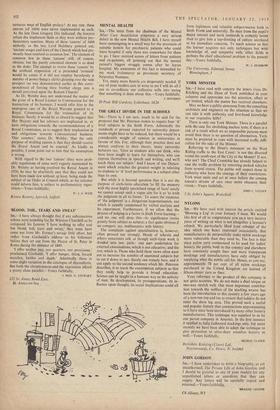THE GREAT DIVIDE IN THE SCHOOLS
SIR,—There is, I am sure, much to be said for the proposal that Mr. Peterson makes to require four `A' level subjects in the Sixth Form. Admittedly the standards at present expected by university depart- ments might have to be reduced, but there would be a considerable weight of opinion in universities in favour of this. For, although their practice does not always conform to their theory, many university lecturers say, 'Give us students who can think, who have been taught to learn for themselves, who can express themselves in speech and writing, and we'll teach them our subject.' And 1 know of one Depart- ment which attaches the greatest weight in selecting its students to 'A' level performance in a subject other than its own.
But while it is beyond question that it is not the purpose of sixth-form education 'to fill the memory with the most highly specialised range of facts' surely we cannot accept such a vague aim for it as `to train the judgment in all its forms.' To assert the existence of 'the judgment' is a dangerous hypostatisation, one which is equally condemned by verbal analysis and by experiment. Furthermore, if we allow that the process of judging is a factor in Sixth Form learning— and no one will deny this—its significance varies greatly from subject to subject; a fact quite obvious if we compare. say, mathematics with history.
The complaint against specialisation is, however, often pressed too strongly. Heads of schools and others sometimes talk as though sixth-form work is divided into two parts : one part undertaken for external examinations, which is not educative; and the rest, which is. Those who hold these views often want not to increase the number of examined subjects but to cut it down to two. Surely one remedy here, and it can apply to the second tendency which Mr. Peterson describes, is to teach the examination subjects so that they really help to provide a broad education. Science can be taught in a humane way as the activity of men. Its development, its presuppositions, its in- fluence upon thought, its social implications could all form legitimate and valuable subject-matter both in Sixth Form and university. To start from the pupil's major interest and work outwards is certainly better than to give him a top-dressing of culture unrelated to his immediate concerns. To teach science so that the learner acquires not only techniques but wide knowledge of, and sympathy with, other fields is perhaps the chief educational problem to the present day.—Yours faithfully,
W. J. SPARROW
The University, Edmund Street, Birmingham, 3










































 Previous page
Previous page